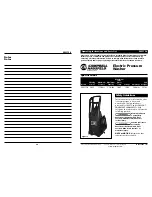
30 Sp
Instrucciones de montaje y lista de piezas
PW1750
Instrucciones de uso
El daño a las superficies de limpieza ocurre
porque la fuerza de impacto del agua
supera la durabilidad de la superficie.
Puede variar la fuerza de impacto
controlando el patrón en abanico de la
boquilla, el ángulo de la boquilla con
respecto a la superficie de limpieza y la
distancia entre la boquilla y la superficie
de limpieza. Nunca utilice un chorro
angosto de alto impacto ni una boquilla
turbo sobre una superficie propensa a ser
dañada. Evite rociar las ventanas con un
chorro angosto de alto impacto o con una
boquilla turbo. Hacer esto puede quebrar
la ventana. La forma más segura de evitar
daños a las superficies es seguir estos
pasos:
1.Antes de apretar el gatillo, ajuste la
boquilla en un patrón en abanico
amplio.
2.Coloque la boquilla aproximadamente a
4-5 pies de distancia de la superficie de
limpieza. Luego sostenga la boquilla en
un ángulo de 45° grados con respecto a
la superficie de limpieza. Dispare la
pistola.
3.Varíe el ángulo de rociado del patrón en
abanico y la distancia a la superficie de
limpieza hasta lograr una óptima
eficiencia de limpieza sin dañar la
superficie.
Una boquilla obstruida o parcialmente
obstruida puede provocar una reducción
significativa del agua que sale por la
boquilla y hacer que la unidad vibre al
rociar.
Para limpiar la boquilla:
• Apague la unidad.
• Cierre el suministro de agua. Libere
toda la presión atrapada en la
manguera apretando el gatillo
2 ó 3 veces.
• Quite la lanza de la pistola.
• Gire la boquilla a la posición de chorro
angosto. Esto abre las paletas de la
turbina.
• Usando el limpiador de puntas que se
incluye, o un sujetador de papeles
desdoblado, introduzca el alambre en
el orificio de la boquilla y muévalo
hacia adelante y hacia atrás hasta
quitar la obstrucción (vea la figura 5).
• Quite las obstrucciones adicionales
pasando agua en dirección inversa a
través de la boquilla. Para hacer eso,
quite la boquilla de la pistola, ponga
un extremo de la manguera de jardín
(con el agua abierta) en la punta de la
boquilla para expulsar agua y residuos
por el orificio trasero de la lanza.
CÓMO EVITAR DAÑAR LAS
SUPERFICIES
INSTRUCCIONES PARA
LIMPIAR LA BOQUILLA
Limpiador de puntas
Boquilla
Figure 5
The use of detergents can dramatically
reduce cleaning time and assist in the
removal of difficult stains. Some
detergents have been customized for
pressure washer use on specific cleaning
tasks. These detergents are approximately
as thick as water. The use of thicker
detergents, such as dish soap, will clog the
chemical injection system and prevent the
application of the detergent.
The cleaning power of detergents comes
from applying them to a surface and
giving the chemicals time to break down
the dirt and grime. Detergents work best
when applied at low pressure.
The combination of chemical action and
high pressure rinsing is very effective. On
vertical surfaces, apply the detergent
starting at the bottom and work your way
upward. This will prevent the detergent
from sliding down and causing streaks.
High pressure rinsing should also progress
from the bottom to top. On particularly
tough stains, it may be necessary to use a
brush in combination with detergents and
high pressure rinsing.
7
www.chpower.com
Operating Instructions and Parts List
PW1750
• Separate lance from gun.
• Rotate nozzle to the narrow stream
setting. This opens up the fan blades.
• Using the included tip cleaner, or an
un-folded paper clip, insert wire into
the nozzle hole and move back and
forth until debris is dislodged (refer to
Figure 5).
• Remove additional debris by back-
flushing water through the nozzle. To
do this, remove the lance from the
gun, place end of a garden hose (with
water running) to tip of nozzle
pushing water and debris out the back
opening of the lance.
Nozzle Cleaning Instructions
(Continued)
Detergents
Tip Cleaner
Nozzle
Figure 5
Figure 6
Water
outlet
Water
inlet
GFCI
Plug
ON/OFF
switch
Garden
hose
Gun
High
pressure
hose
Swivel
Adapter
Lance




































